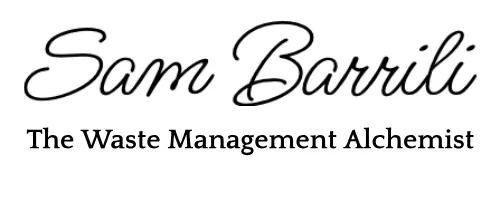Articles

Unlock a 7-Figure Revenue Stream: The Plastic Recycling Formula for Waste Companies
Let’s cut through the fluff and get to the point: there’s money in plastic. Mountains of it. And if you’re a waste management company owner, sitting on the sidelines while others capitalize on this opportunity is not just a mistake—it’s a failure to see the transformation that’s already underway.
Right now, the global conversation about plastic waste is louder than ever. But this isn’t about buzzwords or feel-good speeches. This is about you—the owner of a waste management business—building a powerhouse operation that not only thrives but dominates in a competitive market. Let me show you how collecting and recycling plastic can be the game-changer your company needs.
[Download the Ebook “Thriving With Waste”]
The Opportunity Lying in Plain Sight
Plastics are everywhere: in packaging, construction, automobiles, and even clothing. With over 460 million tons of plastic produced globally each year, it’s the one material that never seems to go out of style. But here’s the kicker: most of it still ends up in landfills, incinerators, or worse—piled up in places it doesn’t belong.
The demand for recycled plastics, however, is skyrocketing. Major brands are scrambling to secure recycled materials to meet their commitments and regulations. They’re willing to pay a premium for quality recycled plastic—especially PET and HDPE, two of the most sought-after materials. And guess what? They can’t meet their demand without companies like yours stepping in to provide it.
This isn’t just an opportunity; it’s an open invitation for waste management companies to make their mark.
[Download the Ebook “Thriving With Waste”]
Why Plastic Recycling Should Be Your Top Priority
If you’re not yet convinced, let me lay out the business advantages that plastic recycling brings to the table:
1. Revenue Streams You’re Missing Out On
Collecting plastic waste for recycling isn’t just about tipping fees anymore. Recycled materials, especially PET and HDPE, can fetch high prices in today’s market.
Beyond selling recycled pellets or flakes, you can offer value-added services like custom processing for manufacturers. More revenue, less hassle.
2. Securing Long-Term Contracts
Manufacturers and brands are desperate for consistent suppliers of recycled plastics. Building relationships with them now means locking in lucrative, long-term contracts.
Companies in sectors like packaging and automotive are ready to partner with reliable recyclers to meet production demands.
3. Positioning Yourself as the Industry Leader
Every competitor out there is hauling waste. Few are strategically capitalizing on the booming market for recycled plastics. Become the go-to company in your region for plastic recycling, and you’ll own the conversation—and the market share.
4. Cost Control Through Operational Efficiency
Investing in advanced sorting technologies and efficient recycling processes can significantly reduce operational costs.
Automation in material sorting and processing isn’t just an upgrade—it’s a strategic edge.
[Download the Ebook “Thriving With Waste”]
How to Make Plastic Recycling Work for Your Business
Now that we’ve talked about the “why,” let’s get into the “how.” Because let’s be honest—without a plan, all this talk of opportunity is just noise.
1. Start with the Right Plastics
Not all plastics are created equal. Focus on the types with high market demand and resale value:
PET (Polyethylene Terephthalate): Think beverage bottles and food containers.
HDPE (High-Density Polyethylene): Used in milk jugs, detergent bottles, and pipes.
These two materials alone can generate substantial profits if collected and processed correctly.
2. Invest in Advanced Sorting Technology
Plastic recycling lives and dies by quality. Contamination can kill your profits faster than anything else. Optical sorters and AI-powered systems can help you:
Identify and separate different plastics quickly and accurately.
Minimize contamination to produce higher-value recycled products.
3. Partner with Manufacturers
Don’t just sell your recycled materials to the highest bidder. Build partnerships with manufacturers who need a consistent supply of recycled plastics. This ensures steady demand and better pricing for your product.
4. Tap into Government Incentives
In many regions, governments offer grants, tax breaks, or subsidies for companies investing in plastic recycling. Use these resources to offset equipment costs and expand operations.
5. Build a Closed-Loop Model
Companies that collect, process, and sell recycled plastic under one roof maximize profits and control. If you’re not ready to invest in processing equipment, partner with local processors to share in the revenue.
[Download the Ebook “Thriving With Waste”]
The Real Value of Plastic Recycling: Dominating Your Market
You’re not just in the waste management business—you’re in the material supply business. The demand for recycled plastics isn’t a passing trend; it’s the future of industries ranging from packaging to construction. Companies that recognize this shift and act decisively are setting themselves up for long-term success.
When you add plastic recycling to your portfolio, you’re doing more than diversifying your revenue streams. You’re creating a system where waste isn’t just hauled away—it’s transformed into a high-value commodity. That’s the kind of business that thrives, even in a crowded market.
[Download the Ebook “Thriving With Waste”]
Case Study: Turning Trash into Cash
Let me give you a real-world example. A mid-sized waste management company in the Midwest added a small-scale plastic recycling operation to its services. They started by focusing on PET bottles, investing in basic sorting and processing equipment.
Within 18 months:
They secured a contract with a regional beverage company to supply recycled PET for bottle production.
Revenue from recycled materials surpassed their tipping fees for municipal waste collection.
Their reputation as an innovative leader attracted new business opportunities, including partnerships with local governments.
This company didn’t reinvent the wheel—they just saw the potential in what others were throwing away.
[Download the Ebook “Thriving With Waste”]
Why You Can’t Afford to Wait
Here’s the brutal truth: if you’re not actively exploring plastic recycling, your competitors are. The market is moving fast, and the companies that seize the opportunity now will dominate tomorrow.
The good news? It’s not too late to get started. But waiting means you’re giving others a head start. With every passing month, the gap between those who act and those who don’t will only grow.
[Download the Ebook “Thriving With Waste”]
The Next Step: Let’s Talk About Your Business
I’ve shared the blueprint. Now it’s your turn to take action. You’ve got two options:
Keep doing what you’ve always done and hope the industry doesn’t leave you behind.
Or make the smart move—add plastic recycling to your business, increase your revenue, and position yourself as a leader.
If you’re ready to stop hauling trash and start turning it into treasure, let’s have a conversation. Book a consultation with me today. I’ll show you how to take your business to the next level and tap into the hidden gold in plastic waste.
This is your chance to thrive in a competitive market. Don’t let it pass you by. Let’s alchemize your waste management company into the profit powerhouse it’s meant to be.
[Download the Ebook “Thriving With Waste”]
Remember: the waste business isn’t about trash—it’s about opportunity. The winners are the ones who see what others miss. Be the winner. Let’s talk.
To Your Success,
Sam Barrili
The Waste Management Alchemist


Sam Barrili
I'm known as the go-to guy for talking about business strategies and growth strategies for waste management companies.
I started my journey in this field in 2009 when I finished my degree in Toxicological Chemistry and joined a wastewater treatment company to develop its market.
Since then, I helped dozens of waste management companies in America and Europe increase their annual profits by over 25 million dollars thanks to my SAM Method.
If you want to know if I'm a good fit for you, read an article or watch a video.
If you find it helpful, I’m probably a good match.
If not, that's OK too.
Call +1 (801) 804-5730
Email: [email protected]

